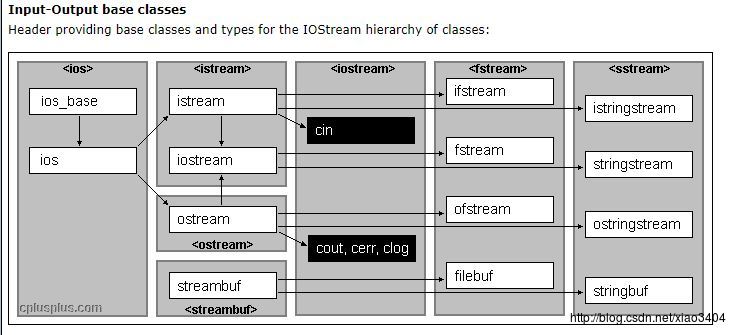文件流(fstream/ifstream/ofstream)作为类成员变量的初始化方式
Posted Jimmy1224
tags:
篇首语:本文由小常识网(cha138.com)小编为大家整理,主要介绍了文件流(fstream/ifstream/ofstream)作为类成员变量的初始化方式相关的知识,希望对你有一定的参考价值。
文件流介绍
在标准模板库中,常见的文件流对象有fstream、ifstream、ofstream三种,我们可以用文件流的方式去操作文件,比如写文件和读文件,文件流类继承图如下:

ifstream继承于istream,实现高层文件流输入(input)操作,它能读取文件中的数据到变量,可以用于读文件,其默认的openmode是in。
ofstream继承于ostream,实现高层文件流输出(output)操作,它将数据信息写入到文件,可以用于写文件,其默认的openmode是out。
fstream继承于iostream,实现高层文件流输出(output)/输出(input)操作,它能实现文件的读写功能,是何种功能取决于openmode的组合。
openmode取值及功能如下:

文件流初始化
当文件流是句部变量时,其初始化方式如下:
//方式一:
std::fstream fs("test.txt", std::ios::in);
//方式二:
std::fstream fs;
fs.open("test.txt", std::ios::in);当文件流作为类成员时,其初始化只能是初始化列表方式,即构造对象时文件,不能在构造函数体中进行操作,否则文件打开失败。
文件操作时的两个注意事项:
- 判断文件流是否正确打开,调用is_open()
- 析构前确保断开文件流和文件的关联,调用close()
文件流应用demo
#include <string>
#include <fstream>
#include <iostream>
class CWriter
public:
//初始化列表方式
CWriter(const std::string &strPath,
std::ios_base::openmode mode=std::ios::out|std::ios::trunc):
m_path(strPath),
m_file(strPath.c_str())
//初始化列表方式
CWriter(const char* pPath,
std::ios_base::openmode mode=std::ios::out|std::ios::trunc):
m_path(pPath),
m_file(pPath)
~CWriter()
//析构时关闭文件流
if (is_file_open())
m_file.close();
bool is_file_open()
return m_file.is_open();
std::string GetPath()
return m_path;
void AddLog(const char* pMsg)
m_file << pMsg << "\\n";
private:
std::string m_path;
std::fstream m_file;
;测试代码:
int main()
CWriter file("test.txt");
std::cout << file.GetPath() << "\\n";
if (file.is_file_open())
std::cout << "file open ok\\n";
else
std::cout << "file open error\\n";
return -1;
file.AddLog("1234");
file.AddLog("1234");
return 0;
运行结果:
当前目录下新生成test.txt文件,其内容是如下:
1234
1234参考资料:
https://stackoverflow.com/questions/20720271/ifstream-variable-in-class
以上是关于文件流(fstream/ifstream/ofstream)作为类成员变量的初始化方式的主要内容,如果未能解决你的问题,请参考以下文章
Java学习笔记6.2.1 字符流 - 文件字符流与缓冲字符流